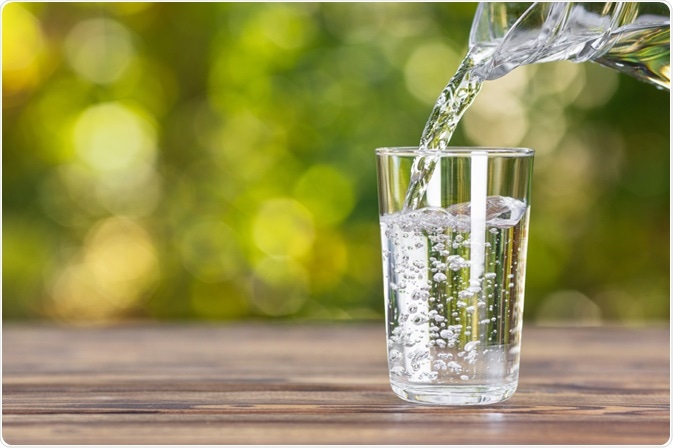Water is an essential element for life. The prevention of dehydration is a critical component to survival: without water, humans can only survive for a few days. As water is the most plentiful molecule inside a cell, it comprises much of the body weight in humans, approximately 75% of body mass in infants and 55% of the mass in the elderly. However, as humans are constantly losing water, maintaining water homeostasis is vital.

Water. Image Credit: Alter-ego/Shutterstock.com
What is water homeostasis?
Whilst water in the human body is found in plasma and the intestine, the overwhelming majority is found within cells. As humans continuously lose water through urine and feces, perspiration, and respiration, a finely balanced and sensitive network of physiological controls is necessary to maintain water levels. This is body water homeostasis, which is maintained by stimulating fluid intake by thirst.
Thirst is a biological instinct, mediated by sensory receptors called osmoreceptors. These receptors are located in the hypothalamus and detect changes in blood plasma. When they detect low blood volume, they signal to the hypothalamus which in turn generates the sensation of thirst. This homeostatic control mechanism ensures a balance between fluid loss and fluid intake.
Dehydration
The term dehydration refers both to the process of losing body water, and the deviation from an ideal hydrated state. It occurs when lost fluids are not replaced, prohibiting the body from carrying out normal functions.
Although dehydration can affect anyone, it is particularly dangerous in young children who can become severely dehydrated following diarrhea and vomiting, and older adults who have a lower volume of water in the body. This means even minor illnesses or chronic disorders can result in dehydration in the elderly. Whilst mild to moderate dehydration can be reversed with fluid intake, severe dehydration requires medical treatment.
Dehydration can lead to serious health complications including:
- Heat injury: Caused when fluid loss through perspiration or exercise is not replaced, heat injuries range from mild heat cramps to heat exhaustion or life-threatening heat stroke.
- Seizures: A state of dehydration is also associated with electrolyte abnormalities. Electrolytes including potassium and sodium assist in electrical signaling between cells. Electrolyte abnormality can cause misfiring between cells, leading to involuntary muscle contractions or loss of consciousness. People with pre-existing seizure disorders such as epilepsy are especially at risk.
- Urinary and kidney problems: Severe or repeated mild bouts of dehydration cause a build-up of wastes and acids in the body, which in turn exposes the kidneys to an excess of myoglobin. The kidneys are responsible for removing myoglobin from the blood, but excess may cause kidney damage and kidney failure.
- Hypovolemic shock: A life-threatening condition that results from losing more than 20% of the body’s blood or fluid supply. The severe loss affects the heart’s ability to pump sufficient blood around the body, leading to organ damage and death.
Hydration
Ensuring adequate fluid intake is critical for many functions. These include:
- Body temperature regulation: Humans are designed to regulate body temperature, particularly when exposed to hot conditions such as a hot climate or during exercise. Losing water through the skin (perspiration) cools the body and helps to maintain homeostatic temperature. Without replacing the lost fluid, however, body temperature will rapidly increase.
- Removing bodily waste: Metabolic processes generate waste products that would otherwise harm the body if retained. Water acts as a solvent for waste products, dissolving them and allowing them to pass out of the body via urine and perspiration.
- Digestive processes: Water taken before, during, and after food aids effective digestion by working with digestive fluids to break down food, enhancing transit through the digestive system. It also aids the absorption of nutrients.
How much water do I need?
Although most people will experience thirst regularly enough to ensure an adequate intake of liquid, attention should still be applied to the amount that is consumed. In 2004, the United States National Academies of Sciences, Engineering, and Medicine established adequate levels of fluid intake for reducing the risk of chronic diseases and ensuring health maintenance. The report stated that men should consume about 3.7 liters of fluid per day, whilst women should consume approximately 2.7 liters per day.
Recommendations for the amount of water we should aim to drink is less clear. Individual fluid requirements vary by factors including age, sex, overall health, and activity levels. Additionally, water intake also comes from food and other beverages so water requirements will vary by lifestyle factors including diet.
Signs of adequate hydration are visible in urine. The chemical urobilin is responsible for the yellow pigmentation of urine and is diluted by fluids. Therefore, the better hydrated a person is, the clearer their urine appears. Dark-colored and strong-smelling urine is a clear sign of inadequate hydration.
References:
- Ahmed M. El-Sharkawy, Opinder Sahota, Dileep N. Lobo, Acute and chronic effects of hydration status on health, Nutrition Reviews, Volume 73, Issue suppl_2, 1 September 2015, Pages 97–109, https://doi.org/10.1093/nutrit/nuv038
- Delpire E, Gagnon KB. Water Homeostasis and Cell Volume Maintenance and Regulation. Curr Top Membr. 2018;81:3-52. doi:10.1016/bs.ctm.2018.08.001
- Nakamura Y, Watanabe H, Tanaka A, Yasui M, Nishihira J, Murayama N. Effect of Increased Daily Water Intake and Hydration on Health in Japanese Adults. Nutrients. 2020;12(4):1191. Published 2020 Apr 23. doi:10.3390/nu12041191
- Popkin BM, D'Anci KE, Rosenberg IH. Water, hydration, and health. Nutr Rev. 2010;68(8):439-458. doi:10.1111/j.1753-4887.2010.00304.x
Last Updated: Jul 12, 2021